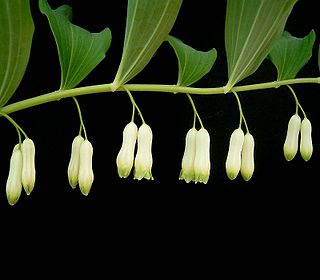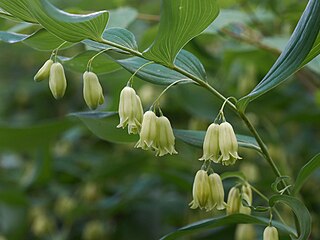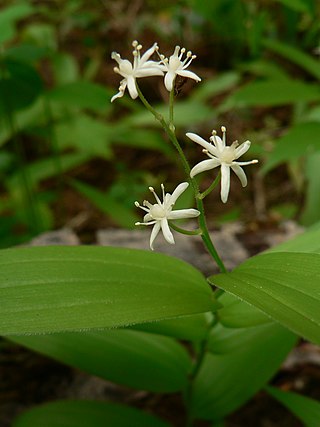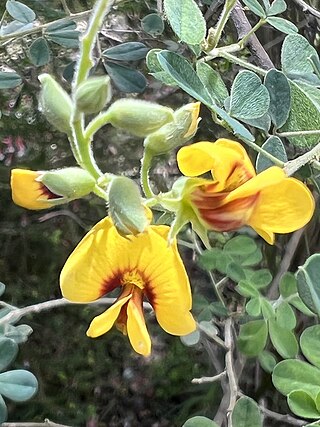
Polygonatum, also known as King Solomon's-seal or Solomon's seal, is a genus of flowering plants. In the APG III classification system, it is placed in the family Asparagaceae, subfamily Nolinoideae. It has also been classified in the former family Convallariaceae and, like many lilioid monocots, was formerly classified in the lily family, Liliaceae. The genus is distributed throughout the temperate Northern Hemisphere. Most of the approximately 63 species occur in Asia, with 20 endemic to China.

Maianthemum racemosum, the treacleberry, feathery false lily of the valley, false Solomon's seal, Solomon's plume or false spikenard, is a species of flowering plant native to North America. It is a common, widespread plant with numerous common names and synonyms, known from every US state except Hawaii, and from every Canadian province and territory, as well as from Mexico.

Polygonatum biflorum is an herbaceous flowering plant native to eastern and central North America. The plant is said to possess scars on the rhizome that resemble the ancient Hebrew seal of King Solomon. It is often confused with Solomon's plume, which has upright flowers.

Polygonatum × hybridum, the garden Solomon's-seal, is a hybrid flowering plant, which is a cross between common Solomon's-seal and angular Solomon's-seal.

Polygonatum multiflorum, the Solomon's seal, David's harp, ladder-to-heaven or Eurasian Solomon's seal, is a species of flowering plant in the family Asparagaceae, native to Europe and temperate Asia. In Britain it is one of three native species of the genus, the others being P. odoratum and P. verticillatum.

Polygonatum odoratum, the angular Solomon's seal or scented Solomon's seal, is a species of flowering plant in the family Asparagaceae, native to Europe, the Caucasus, Siberia, the Russian Far East, China, Mongolia, Korea, Nepal and Japan. In the United Kingdom it is one of three native species of the genus, the others being P. multiflorum and P. verticillatum.

Maianthemum stellatum is a species of flowering plant, native across North America. It has been found in northern Mexico, every Canadian province and territory except Nunavut, and every US state except Hawaii and the states of the Southeast. It has little white buds in the spring, followed by delicate starry flowers, then green-and-black striped berries, and finally deep red berries in the fall.
Odoratus is a Latin adjective meaning "fragrant, perfumed", and may refer to:

Goodyera pubescens, the downy rattlesnake plantain, is one of the most common orchids native to eastern North America. It is found from Florida to Nova Scotia, west to eastern Oklahoma, Minnesota and Ontario.

Grass Wood is an ancient woodland of 88 hectares in Wharfedale, North Yorkshire, England, that has an exceptional ground flora of woodland wildflowers.

Blephilia hirsuta, commonly known as hairy wood-mint or hairy pagoda plant, is a species of herbaceous perennial in the mint family Lamiaceae. It is native to eastern North America.
Acanthopale pubescens is a species of the genus Acanthopale of the family Acanthaceae. The species occurs in East and Southern Africa. Acanthopale pubescensis also known as Herayye in Ethiopia.

Johnsonia pubescens, commonly called the pipe lily, is a grass-like plant in the family Asphodelaceae, subfamily Hemerocallidoideae, endemic to the south-west of Western Australia. As with others in the genus, it is distinguished by its minute flowers which are on the end of a spike and hidden by large, overlapping, papery bracts.

Hydrophyllum appendiculatum, commonly known as great waterleaf, appendage waterleaf, or woolen breeches, is a species of plant in the Boraginaceae (borage) family. It is native to central and eastern North America where it is found primarily in the Midwest and Upper South of the United States. It is a biennial that produces lavender-colored flowers in late spring and early summer.

Polygonatum humile, the dwarf Solomon's-seal, is a species of plant in the family Asparagaceae. The plant is said to possess scars on the rhizome that resemble the ancient Hebrew seal of King Solomon. This is a perennial species of the genus Polygonatum native to China, Japan, Kazakhstan, Korea, Mongolia and parts of Russia.

Goodia pubescens, commonly known as golden tip, is a species of flowering plant in the family Fabaceae and is endemic to south-eastern Australia. It has trifoliate leaves and bright yellow pea flowers.















